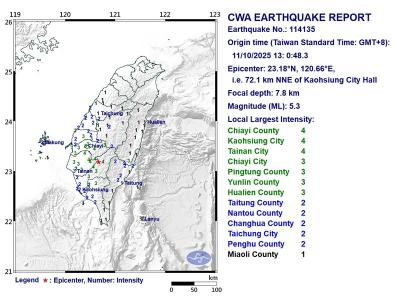The Taichung District Prosecutors’ Office detained a 30-year-old woman surnamed Lin (林) on Tuesday after the woman informed police that she had killed her mother by setting her on fire and pushing her into a drain.
Preliminary investigations into the incident indicate that Lin, a resident of the municipality’s Daya District (大雅), who is psychologically impaired, allegedly pushed her 50-year-old mother, who has been completely disabled by a stroke for more than a year, to a remote part of the city before dousing her with gasoline and setting her on fire at about 1pm on Tuesday.
Investigators said that Lin was sitting by the road when they arrived and admitted that she had doused her mother with gasoline, set her on fire and pushed her into the 4m-deep drain.
Police rushed Lin’s mother to hospital, but she showed no vital signs on arrival and was declared dead after attempts at resuscitation failed.
Investigators said Lin allegedly murdered her mother before calling the police, adding that Lin said she killed her because she could not stand to see her in pain, and she originally planned to hang herself after the murder.
Lin said neither her father, sister or brother helped her care for her mother following her stroke.
Lin’s sister said Lin often shouted at her mother at home, adding that the family’s finances were in a poor state as Lin’s mother had accumulated a sizeable credit-card debt prior to falling ill.
The family’s income consists of the father’s salary as a mechanic and her own salary — a total of about NT$50,000 — the younger sister said, adding that when her younger brother was working out of town, he rarely sent money home.
The younger sister said the family were unable to afford the services of an all-day caretaker, which was why they asked Lin to take care of her.
In light of the incident, the Taichung City social welfare bureau said it would campaign for people with disabled elderly relatives to make better use of the city government’s services.
The bureau said it was unfortunate it had never received petitions for help from the Lin family.
Additional reporting by Yang Cheng-chun and Su Chin-feng

The Central Weather Administration (CWA) today issued a sea warning for Typhoon Fung-wong effective from 5:30pm, while local governments canceled school and work for tomorrow. A land warning is expected to be issued tomorrow morning before it is expected to make landfall on Wednesday, the agency said. Taoyuan, and well as Yilan, Hualien and Penghu counties canceled work and school for tomorrow, as well as mountainous district of Taipei and New Taipei City. For updated information on closures, please visit the Directorate-General of Personnel Administration Web site. As of 5pm today, Fung-wong was about 490km south-southwest of Oluanpi (鵝鑾鼻), Taiwan's southernmost point.

Almost a quarter of volunteer soldiers who signed up from 2021 to last year have sought early discharge, the Legislative Yuan’s Budget Center said in a report. The report said that 12,884 of 52,674 people who volunteered in the period had sought an early exit from the military, returning NT$895.96 million (US$28.86 million) to the government. In 2021, there was a 105.34 percent rise in the volunteer recruitment rate, but the number has steadily declined since then, missing recruitment targets, the Chinese-language United Daily News said, citing the report. In 2021, only 521 volunteers dropped out of the military, the report said, citing

A magnitude 5.3 earthquake struck Kaohsiung at 1pm today, the Central Weather Administration said. The epicenter was in Jiasian District (甲仙), 72.1km north-northeast of Kaohsiung City Hall, at a depth of 7.8km, agency data showed. There were no immediate reports of damage. The earthquake's intensity, which gauges the actual effects of a temblor, was highest in Kaohsiung and Tainan, where it measured a 4 on Taiwan's seven-tier intensity scale. It also measured a 3 in parts of Chiayi City, as well as Pingtung, Yunlin and Hualien counties, data showed.

Nearly 5 million people have signed up to receive the government’s NT$10,000 (US$322) universal cash handout since registration opened on Wednesday last week, with deposits expected to begin tomorrow, the Ministry of Finance said yesterday. After a staggered sign-up last week — based on the final digit of the applicant’s national ID or Alien Resident Certificate number — online registration is open to all eligible Taiwanese nationals, foreign permanent residents and spouses of Taiwanese nationals. Banks are expected to start issuing deposits from 6pm today, the ministry said. Those who completed registration by yesterday are expected to receive their NT$10,000 tomorrow, National Treasury